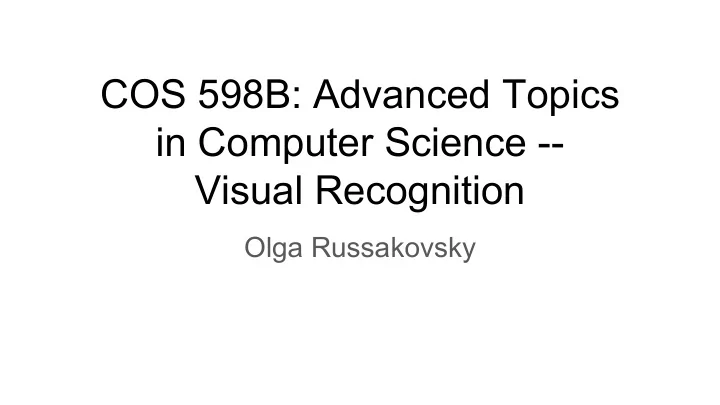

COS 598B: Advanced Topics in Computer Science -- Visual Recognition Olga Russakovsky
Course goals ● Deep dive into computer vision ○ Gain a deeper understanding of the selected topics, including key papers and key players ○ Explore the interplay between CV tasks, datasets, methods, analyses, results ○ Discover entry points to learn more about other computer vision topics of interest ● Develop/reinforce research skills ○ Become comfortable reading research literature, incl. doing a literature search ○ Hone both written and speaking scientific communication ○ Practice fair & constructive peer review
Course structure ● Grad seminar, thus assume largely self-motivated ● Reflects the diversity of students here ○ Can/should be adapted to fit your needs ● 2 components: lectures and project
(in reverse order) Component #2: Project ● Work alone or with a partner ● Produce an 8-page paper in CVPR format ● Provide feedback on projects to 1-2 other teams ● Schedule ○ Wed, April 11th in class: project title, selection of option 1-3, (optional) partner name ○ Fri, April 13th : milestone report, 4+ pages ○ Fri, April 20th : milestone feedback due to your assigned team(s) ○ Mon, April 30th and Wed, May 2nd: project spotlights in class ○ Fri, May 6th : project report due ○ Dean’s date May 15th : report feedback due to your assigned team(s)
Project option a) Computer vision system ● Project similar to COS 429 requirements last semester ● Build and analyze a computer vision system ● Report should include ○ Introduction positioning the problem and proposed approach ○ Overview of related work ○ Description of the method ○ Quantitative and qualitative results ○ Analysis and conclusion
Project option b) Analysis ● Pick a visual recognition topic and perform an analysis of existing techniques ○ Decide on a particular angle of analysis (across datasets, across methods, etc) ○ Download the related code/data/annotations, code/script to generate the results ● For inspiration, check out ○ [Toralba and Efros ICCV’11] on image classification datasets ○ [Russakovsky et al. ICCV’13] on large-scale object localization ○ [Sigurdsson et al. ICCV’17] on human activity recognition ● Report should include ○ Introduction positioning the investigation, related work, lots of analysis and conclusions
Project option c) Literature review ● Think of this as a book chapter ● Can be about a topic from class but much more in depth ○ Should include 20+ citations, both classical literature and latest techniques ● Target audience: COS 429 student who wouldn’t take COS 598B ● See e.g., Crowdsourcing in Computer Vision ○ But yours will be 8 pages, with fewer citations but more in-depth look at each one
Component #1: Lectures ● 3 modules: (1) pixel-level understanding, (2) language+vision, (3) video analysis ○ Each module is 3-4 weeks, thus 6-8 lectures, with 1-3 papers per lecture ○ Generally lectures earlier in a module are predetermined by papers we need to cover, and later are more flexible and can be guided by your interest ● Most lectures given by you ○ Assume little hand-holding on logistics-- but happy to provide all the help you want on content ○ Will get feedback from classmates afterwards ○ Can lecture in pairs if you prefer but then expect do to ~2x more lectures
When giving a lecture ● Come meet with me before your lecture ○ Wed 4:30-5:30pm in CS 408, or by appointment ○ For more junior students: 2+ weeks ahead of time (!) recommended ○ Helpful to have read the paper and drafted a rough plan before the meeting ● Coordinate with me & post on PIazza if there’s a paper (or a section of a paper) that would be helpful as background reading ● Post slides after the lecture ● Take responsibility for figuring out a backup plan if you’re not going to be there suddenly
When giving feedback on a lecture ● Expect to do this ~3x more times than lectures ● Must read the papers beforehand ● 1+ page feedback emailed to the present(s), cc’ing me, within a day of the presentation ○ Comment on clarity, completeness, slides, … ○ Offer constructive criticism but also suggestions
When not giving the lecture or feedback ● Come to class (duh) ● Ask lots of questions ● No email, faceboook, twitter, snapchat, ... ● Good idea to read the papers beforehand ○ Definitely read the background papers, if posted ● If you have to miss class: read the papers and look at slides to catch up
Let’s look at the schedule ● Schedule is here, and will be updated throughout the semester ○ Presenters will post links to slides, background readings, papers, etc. ○ Please comment on the doc with updates and I’ll incorporate the changes into the main text
Week 6 (March 12-16): Option 1 ● Class as in, add another week of e.g., video analysis ● Must commit to coming despite midterms & ECCV deadline
Week 6 (March 12-16): Option 2 ● Class canceled in favor of midterms & ECCV deadline ● Instead: attend the 3 amazing computer vision CS department seminars later in the spring ● Also: PhD students, help extra with Visit Day March 15-16
Sign up for lectures ● Fill out this Google form to submit your preferences ● Volunteers for week 2: FCN and FCN weakly supervised ● Any questions on topics, structure, …?
Recommend
More recommend